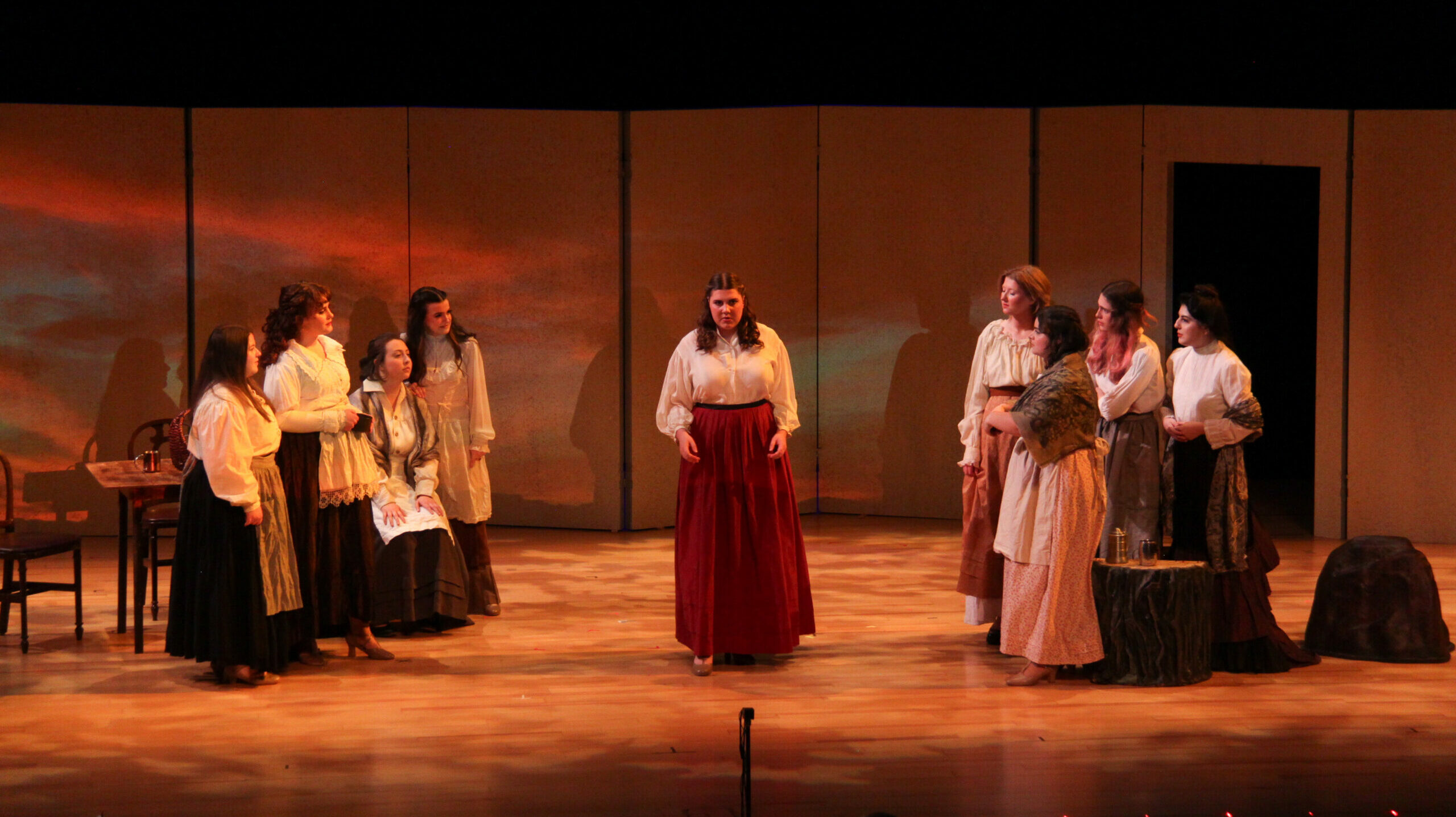Members of Butler Opera Theatre perform a scene from the two-act show “Demons & Darlings”. Photo by Faith Delamarter.
GWEN PAVICH | STAFF REPORTER | gpavich@butler.edu
On Friday, Nov. 10 and Saturday, Nov. 11, Butler Opera Theatre dove into classics and eerie opera scenes with their performances of “Demons & Darlings”.
Butler Opera Theatre primarily consists of students in Jordan College of the Arts who perform a full opera production every year. However, during alternating semesters, Butler Opera Theatre showcases multiple scenes and songs from various operas and combines them into a two-act show. “Demons & Darlings” was comprised of acts and scenes from varying classic operas, which allowed students to play multiple roles throughout the show.
Sam Jones, a junior vocal performance and German double major, went into detail about what different operatic styles were showcased in the performance. He explained how the acts of the show contrast with each other due to the first act’s spookier feel, while the second act highlights parts from several more classical operas.
Whether an audience member was a fan of the stories that were more suspenseful or spooky or were more drawn to the classic opera style, there was something in the show for everyone to enjoy.
Jones explained how the eerie and classic aspects of the opera scenes created an unfamiliar yet enjoyable atmosphere for the audience.
“There [was] a little bit of something for everybody,” Jones said. “[The production had] tales of love [and] heartbreak. [There were also darker aspects] to the show such as vampires, a medium and dolls. Also with opera, it’s larger than life. You can relate to some of these characters but also, these are stories you just don’t see every day.”
Most of the cast was able to portray at least one character in each act of the performance. The cast members were able to portray stylistically different characters between the acts as well.
Senior music composition major Isabelle Calkins indicated how different her characters were between the show’s two acts.
“In the first scene of Act 1, I [played] Miss Jessel from Benjamin Britten’s ‘The Turn of the Screw’,” Calkins said. “She is the ghost of the previous Governess of Bly Manor, and she is trying to possess Flora, the little girl [who] was in her care while she was alive. Her counterpart Peter Quint, meanwhile, does the same with Flora’s brother Miles. In the second scene of Act 2, I [played] Alice Ford from Otto Nicolai’s ‘The Merry Wives of Windsor’. She and her best friend Margaret Page have received the same love letter from the lecherous John Falstaff, and they plot their revenge.”
Many operas can often be viewed as boring and confusing to young people, including college students. But Jones found a way to connect to opera as a college student and one of the characters they portrayed in this particular show.
“One of the roles I [portrayed] is in ‘La Bohème’, [and] I [played] Rodolfo,” Jones said. “He’s a poet. I do music [as well as] study language, so [there is a] kind of connection there. But the thing that I love about opera is [that] a lot of the time, the stories are very otherworldly or [portray] things you don’t see every day. [Opera is an] opportunity for me to be somebody I’m not.”
Much like any sort of art form, opera has its own sets of characteristics and challenges that come along with it. In opera, performers have to be able to portray a story through the use of music and song, sometimes without any spoken dialogue, throughout the entire show.
Jana Dinkeloo, a senior vocal performance and arts administration double major, said the show posed some particular challenges.
“[One of the scenes] was originally in German, and there wasn’t an English translation because it’s not very widely performed,” Dinkeloo said. “A lot of my rehearsal time at the beginning [was spent] rewriting the lyrics into a sensical English translation. I think that was kind of hard because I’m not a lyricist. Usually, I just read [whatever is] on the page. [Also], the music is so cool, but it’s difficult because there’s [so many] things going on, and everybody’s singing on top of each other. That was hard to originally get it [all] together because there’s just so much going on, but it’s super cool.”
Despite opera’s unique characteristics and challenges, it can often be perceived as a singular genre. But this particular show allows the members to showcase that opera can fit into more than one box.
Calkins said what some of her favorite aspects of “Demons & Darlings” were and how they have further benefited her outside of Butler Opera Theatre.
“I love that we [got to] present to the audience such a diverse picture of a truly unique genre,” Calkins said. “Opera often gets pigeonholed as one thing in the minds of people who might not be as familiar with it, and even those [who] are. The show [gave a] taste of how much variety there is and how fun it can be. Also, getting to rehearse and perform with the other incredible musicians, directors and crew involved in this production has elevated my musicianship and inspired me in a way that is quite exciting.”
Butler Opera Theatre’s next performance, “Albert Herring” by Benjamin Britten, will be held at Schrott Center of the Arts on Friday, April 12, and Saturday, April 13, 2024. Learn more about Butler Opera Theatre and all of Butler University’s music ensembles on the School of Music website.



